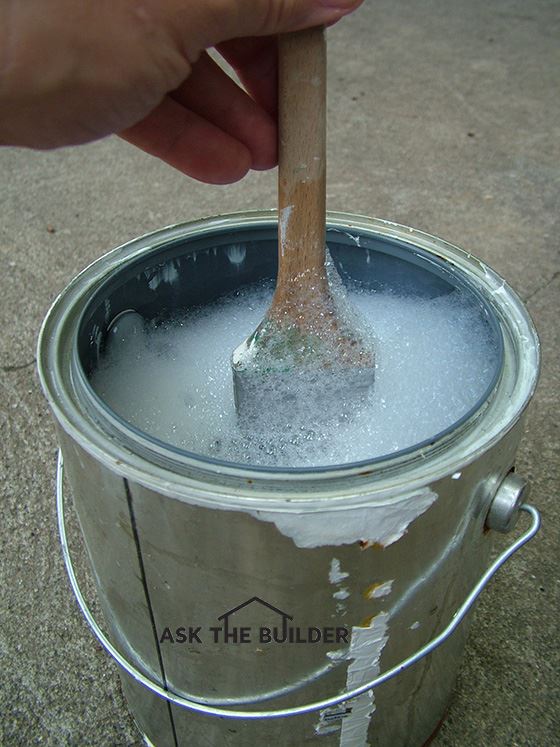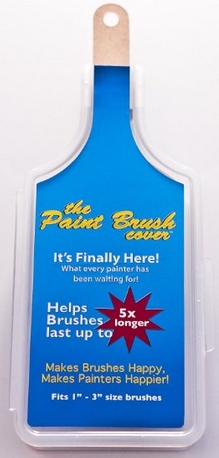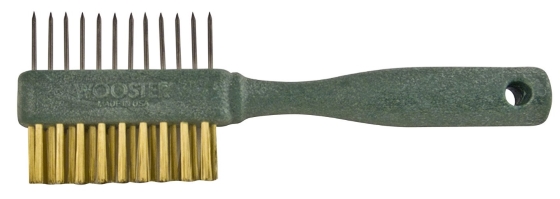Cleaning Paint Brushes

An old paint can, some warm water and soap and a quick wrist is all it takes to clean a paint brush. ©2017 Tim Carter
Cleaning Paint Brushes TIPS
- Brush-renewal products = DEATH
- Get brushes wet before use
- WATCH brush videos below
- Use Swish method to clean - See below
- CLICK HERE to Get Tim's FREE & FUNNY Newsletter!
DEAR TIM: I'm having trouble cleaning paint brushes. My high-quality paint brushes are stiff halfway up from the tips, even though I have been using latex paint and washing them with warm water immediately after each use.
I've tried using the plethora of products that claim they will restore paint brushes, but none have worked.
In fact, they seem to harm the brushes. How do you clean paint brushes so they last for years? Is it possible, or should I just buy disposable paint brushes and throw them away after each job? Jack L., Findlay, OH
DEAR JACK: It's time for some tough love.
Operator Error
The expensive brushes are being ruined because you're not cleaning them properly. It took me a few years of experimentation to figure out one way to properly clean paint brushes, no matter whether they are synthetic fiber used for latex paint or natural fiber used for oil paints.
Believe it or not, I have a few paint brushes that have been used over one hundred times. They look like new, and the bristles have no paint in them where they connect to the brush body.
CLICK HERE to get FREE & FAST BIDS from local painters so you never clean a brush again! WOO HOO!
Best Paint Brushes Video
Watch this video so you know what brush to use where and why.
Brush Renewal Products - BAH!
You couldn't pay me to use brush-revival products. I've read their labels on many occasions, and the skull and crossbones image tells me that some of these products are highly toxic.
Examine the label of these products and you'll often see the chemical names acetone, methanol, methylene chloride, toluene and xylene.
Some of these are very dangerous and can cause serious and permanent health issues. It's easier and safer to simply learn how to care for your paint brushes rather than try to bring them back from the dead.
Before You Dip
The process of cleaning a paint brush starts at the beginning of the painting day. All too often, I see people take a new brush or a dry one and dip it directly into the paint.
This, in my opinion, is a mistake. On hot, dry days the paint on the outside of the brushes up near the handle can harden within an hour or two.
Wet The Bristles
You can prevent this, or slow the hardening of the paint, by wetting the brush with water before using it. Use water when applying latex or water-based paint.
If you are painting with oil-based paint, dip the brush in paint thinner before getting paint on the brush. Be sure to lightly shake out any excess water or paint thinner before dipping the brush for the first time into the paint.
Brush At Breaks
If you take breaks during painting, you need to get the brush out of the sun, and wrap it with a damp rag if you are using latex paint. This rag stops the evaporation of water and other chemicals from the paint. It keeps the paint on the brush fresh.
Use a rag soaked in paint thinner if you are applying oil-based paint. It's advised to store the paint thinner-soaked rag and brush in a closed container for safety. If painting outdoors, I'll actually clean my brush if I stop to eat lunch. It only takes two minutes to clean a brush, so I don't lose much time from my well-deserved break.
Brush Protectors
There are some very clever inventions you can use to keep the paint on a brush from getting hard while you take a break. If you use one, be sure to keep it out of direct sunlight.

This is a plastic case you put your brush in while you take a break. It seals tight preventing air from drying the paint. CLICK THE IMAGE TO ORDER IT NOW.
Paint Brush Protector Video
Watch this video to see how these plastic covers work.
Never Upside Down!
I have seen people ruin a brand-new paint brush the first time they clean it. They turn on the sink faucet and then turn the brush upside down to get the water stream to shoot straight into the tips of the bristles.
Never do this.
It's totally unnecessary.
No Pressing!
Another bad idea is pushing down on the bristles so they bend at a 90-degree angle to squeeze out the paint. This stresses the bristles and causes premature bristle failure.
Brush Out First
Before you start to clean a brush, try to get as much paint out of it by brushing it on a scrap piece of anything. It could even be a cardboard box. Don't press so hard as to really bend the bristles. You're just trying to get off the easy-to-remove paint.
CLICK HERE to get FREE & FAST BIDS from local painters so you never clean a brush again! WOO HOO!
Rinse Next
Through trial and error, I discovered that the best way to clean brushes that have latex or water-based paint in and on them is to rinse as much paint out as I can with warm water flowing over the outside of the bristles, toward the bristle ends.
Swish It
The next step is to use an old paint can that's been cleaned of all paint. I fill this can halfway with warm soapy water. Two tablespoons of common liquid dish soap works well in a half-gallon of water.
Dip the brush into the soapy water and rapidly move it back and forth, making sure the bristles do not touch the bottom of the can.
Be careful, as vigorous movement can splash some of the warm soapy paint-saturated water onto your clothes or in your face. Twenty seconds of back-and-forth motion will remove 95 percent of the paint from the entire brush.
Clear Rinse
Refill the can halfway with just clear warm water and repeat the process. If the water turns slightly cloudy, it means you still have more paint in the brush.
Clear Swishing = Clean
Continue the fresh-water rinsing process until the water stays perfectly clear. If there is hardened paint on the handle or tops of the bristles near the handle, use a stiff nylon brush to clean off this paint.

This is a specialized tool with brass stiff bristles to clean the semi-hardened paint from bristles up near the ferrule. The brass will not harm the bristles. The other side is a comb for once the brush is clean. CLICK THE IMAGE NOW TO GET THIS TOOL.
Brush DOWN the bristles with the stiff brush. Push down only do NOT try to brush up and down.
Do NOT scrub the bristles at a 90-degree angle to remove the paint.
Suspend Test
The best way to determine if there is any residual paint in the brush is to suspend it in a clear container after you think it is clean. Use a string or thin wire through the hole at the end of the brush handle to suspend just the bristles in clean water.
Let it sit in the water for about four hours. If there's any latex paint left in the brush, it will turn the water cloudy. This means you have to be more thorough when you are cleaning the brush.
No Shaking But Comb It
Once clean, comb the bristles. Then hang the brush from the wire to get it to dry.

This is a handy tool to comb paint brushes after they're clean. The other side you use to scrape as much paint as possible from a paint roller before you start to clean it. CLICK THE IMAGE NOW TO BUY THIS GREAT TOOL.
Do not shake the water out of the brush and bend the bristles. Once dry, insert the brush in the handy protective cover that came with it from the paint store.
CLICK HERE to get FREE & FAST BIDS from local painters so you never clean a brush again! WOO HOO!
Column 686
23 Responses to Cleaning Paint Brushes